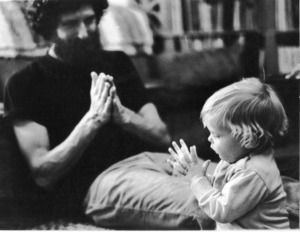 We've all seen the "doofus" dad on TV. From Ozzy Osbourne to Homer Simpson, these dads are depicted as incapable of completing even the most mundane household and child-rearing tasks.
We've all seen the "doofus" dad on TV. From Ozzy Osbourne to Homer Simpson, these dads are depicted as incapable of completing even the most mundane household and child-rearing tasks.
Scott Coltrane with his son, 1980. Photo: Linda MuehlhauserBut such depictions are far from new, said sociologist Scott Coltrane, Dean of the UO College of Arts and Sciences -- remember Archie Bunker from "All in the Family"?
Nor are these portrayals entirely accurate, said Coltrane, who recently gave a campus talk entitled "Men's Family Work: What's Changing and What's Not," sponsored by the Center for the Study of Women in Society.
"Men's contributions to the household doubled from 15 percent to over 30 percent from 1965-2003," said Coltrane, who has studied these issues for 25 years. And the time men spent on childcare tripled during the same time frame.
But this doesn't mean women are doing less work than in the past. Mothers are actually spending more time with their children than in past decades and are doing more soccer-mom-type activities, so they continue to do twice as much work as fathers, even though they have entered the workforce in large numbers.
Nonetheless, the number of fathers who are active in completing household chores has indeed increased, said Coltrane. They're washing more dishes and clothes, cooking and cleaning the house.
And the time that fathers spend in quality childrearing has a significantly positive impact on child outcomes, such as achievement in school and in their own roles as mothers and fathers in the future. "Fatherhood is good for all of us," said Coltrane.
Thus while the "doofus" dad likely will continue to be a master narrative on TV, it isn't a true reflection of the roles that fathers increasingly are playing within their families, said Coltrane. However, these inept TV fathers are spending time with their families, which does in a sense track with real-life trends.
- Anne Conaway


 When the volcano erupted, a UO professor discovered that local residents consoled themselves through song.
When the volcano erupted, a UO professor discovered that local residents consoled themselves through song.

 Join UO neuroscientists as they bring the host of the PBS series, The Human Spark into their brain research lab.
Join UO neuroscientists as they bring the host of the PBS series, The Human Spark into their brain research lab.  Temple Grandin, perhaps the world's best known person with autism, drew an overflow crowd to her UO talk.
Temple Grandin, perhaps the world's best known person with autism, drew an overflow crowd to her UO talk.

 Watch a slideshow about Elena Rodina's journalistic globetrotting, from the Arctic Circle to Cuba.
Watch a slideshow about Elena Rodina's journalistic globetrotting, from the Arctic Circle to Cuba.